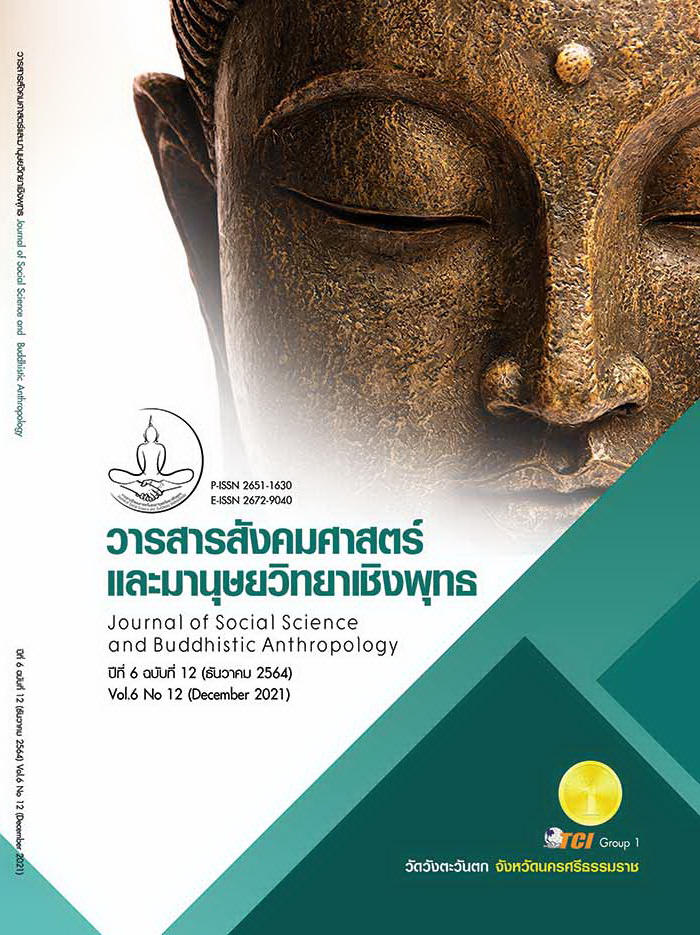A PATTERN OF RESPONSIBLE TOURISM MANAGEMENT IN SECOND TIER CITY, A CASE STUDY OF MAE HONG SON PROVINCE
Keywords:
Management Model, Responsible Tourism, Second Tier Tourism City, Organization Relating tourism, Mae Hong son ProvinceAbstract
The objectives of this research article were to study tourism operation in accordance with responsible tourism of involving organizations and tourism community and suggest how to manage responsible tourism to tourism involving organizations in second tier city, Mae Hong Son Province. It is qualitative research; the research methods consist of documents research relating to responsible tourism, field survey, focus group discussion, and in - depth interview. The key informants include government organizations relating to tourism, tourism business operators, and the representative from community - based tourism. The results found that the model of tourism operations of government organizations and tourism communities are consistent with responsible tourism approach – establishing the organization to protect resources, training for tourism staff, promoting employment through tourism, promoting local traditional and cultural events for tourism, using ingredients in the community cooking for tourist, and tourism community sharing the tourism work. Recommendation for responsible tourism management consists of work integration among government organizations, containing responsible tourism into organization’s plan, renovating the area and old building for tourism, managing environmental system for tourism, use the tourism taxes to develop environment, setting of regulations for tourist, register a vehicle for tourism, preparing security plan and life insurance for tourist, collecting resources data, controlling the number of tourist, preparing guide book for tourist, developing tourism infrastructures for all tourists, providing the underprivileged people in community to participate in tourism, managing safety and security in tourist attraction and tourism activity, standardizing tourism service, and promoting the small, medium - sized local tourism business operator to be competitive.
References
กระทรวงการท่องเที่ยวและกีฬา. (2563). สถิตินักท่องเที่ยวภายในประเทศปี 2562 (จำแนกตามภูมิภาคและจังหวัด). เรียกใช้เมื่อ 20 มีนาคม 2564 จาก https://www.mots.go.th/more_news_new.php?cid=618
การท่องเที่ยวแห่งประเทศไทย. (2562). การสร้างสรรค์สินค้าการท่องเที่ยวรูปแบบการท่องเที่ยวอย่างมีความรับผิดชอบ (รายงานการวิจัย). กรุงเทพมหานคร: การท่องเที่ยวแห่งประเทศไทย.
มูลนิธิสถาบันการท่องเที่ยวโดยชุมชน. (2556). คู่มือมาตรฐานการท่องเที่ยวโดยชุมชน. เชียงใหม่: วนิดาการพิมพ์.
สำนักงานสภาพัฒนาเศรษฐกิจและสังคมแห่งชาติ. (2560). แผนพัฒนาเศรษฐกิจและสังคมแห่งชาติ. เรียกใช้เมื่อ 15 มกราคม 2563 จาก https://www.nesdc.go.th
องค์การบริหารการพัฒนาพื้นที่พิเศษเพื่อการท่องเที่ยวอย่างยั่งยืน (องค์การมหาชน). (2559). คู่มือเกณฑ์มาตรฐานการบริหารจัดการแหล่งท่องเที่ยวโดยชุมชน. เรียกใช้เมื่อ 1 ตุลาคม 2559 จาก http://www.gspa.buu.ac.th/roc/images/stories/food/up2/1.pdf
Frey, N. & George, R. (2010). Responsible tourism management: The missing link between business owners’ attitudes and behaviour in the Cape Town tourism industry. Tourism Management, 31(2010), 621-628.
Global Sustainable Tourism Council. (2012). Global Sustainable Tourism Destination Criteria. Retrieved June 12, 2015, from http://www.gstcouncil.org
Goodwin, H. (2014). Cape Town Declaration on Responsible Tourism. Retrieved March 15, 2021, from https://responsibletourismpartnership.org/cape-town-declaration-on-responsible-tourism/
(2014). WHAT IS RESPONSIBLE TOURISM. Retrieved April 27, 2019, from http://responsibletourismpartnership.org/what-is-responsible-tourism/
Hausler, N. et al. (2012). Myanmar Responsible Tourism Policy. Retrieved September 20, 2019, from https://www.hss.de/fileadmin/media/downloads/Berichte/121015_Myanmar_Tourism_English.pdf
Medeiros, H. M. N. et al. (2021). Alternative Tourism and Environmental Impacts: Perception of Residents of an Extractive Reserve in the Brazilian Amazonia. Retrieved June 12, 2021, from https://www.mdpi.com/2071-1050/13/4/2076
Mihalic, T. (2016). Sustainable-responsible tourism discourse towards ‘responsustable’ tourism. Journal of Cleaner Production, 111(B), 461-470.
Rasdi, A. L. M. et al. (2019). Responsible tourism and quality of life: perspective of local community. Journal of Tourism, Hospitality and Environment Management, 4(13), 49-56.
TAT Intelligent Center. (2561). เข็มทิศท่องเที่ยวไตรมาส 4/2561. เรียกใช้เมื่อ 12 มีนาคม 2564 จาก https://marketingdb.tat.or.th/documents/10181/58221/Compass-Q4-2561.pdf/c2b9b2b4-f226-4dc5-aa3c-d804b55ddc1b
World Economic Forum. (2020). The travel and tourism competitiveness Report 2019, travel, and tourism at a tipping point. Retrieved January 5, 2021, from http://www3.weforum.org/docs/WEF_TTCR_2019.pdf
Xin, T. K. & Chan, J. K. L. (2014). Tour operator perspectives on responsible tourism indicators of Kinabalu National Park, Sabah. 5th Asia Euro Conference 2014. Procedia - Social and Behavioral Sciences, 144(2014), 25-34.









